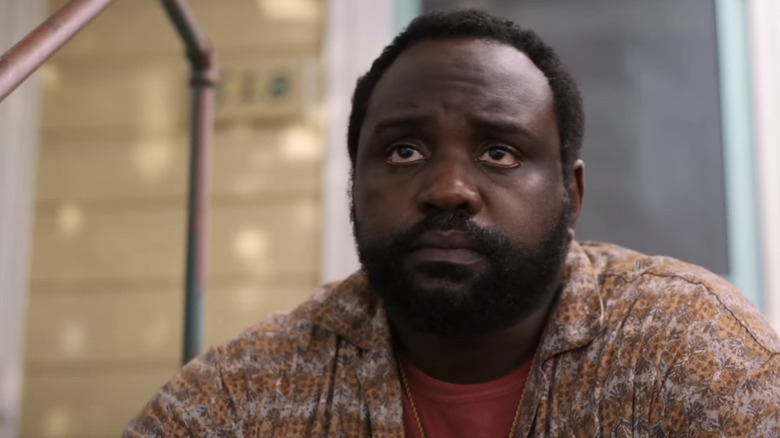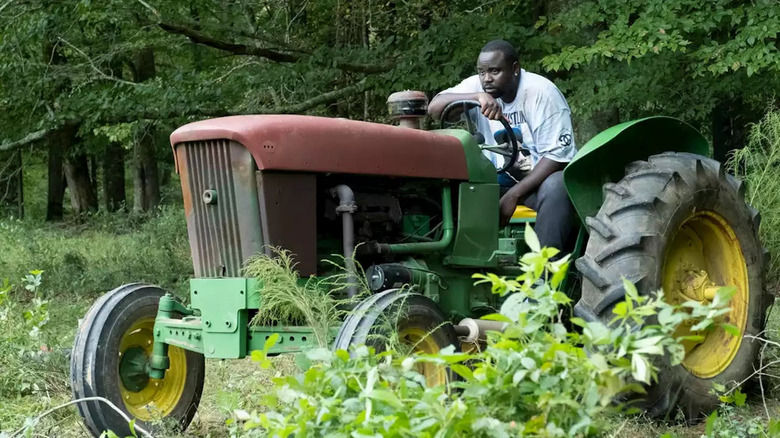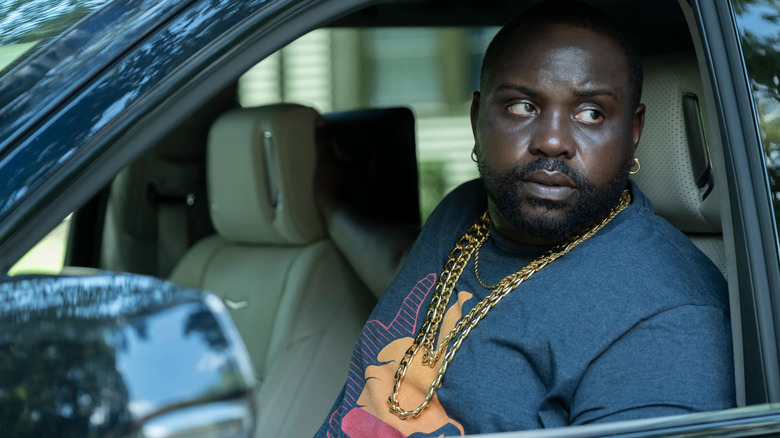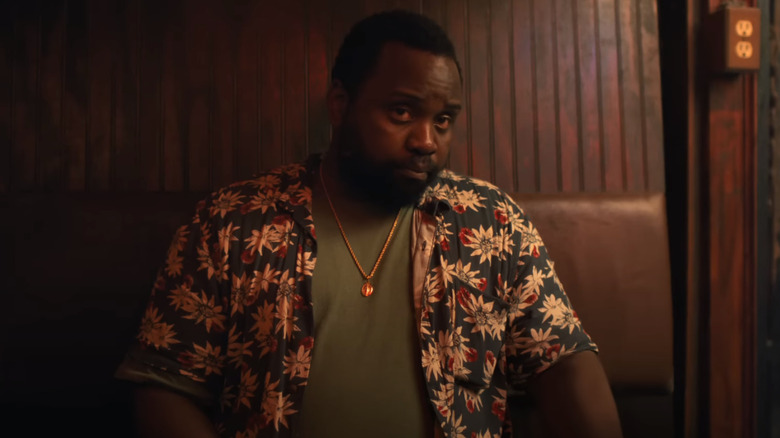How Causeway Helped Brian Tyree Henry Let Go Of Paper Boi's Tragedies In Atlanta [Exclusive]
The art of acting requires performers to get in the headspace of their characters, and that can be draining when a person frequently plays characters going through trauma. Brian Tyree Henry has played his fair share of guys going through it, from Alfred (a.k.a. Paper Boi) on the FX series "Atlanta" to the empathetic superhuman Phastos in "The Eternals," but he hadn't quite figured out how to let go of those experiences. In an exclusive interview with /Film's Ethan Anderton, Henry discussed how playing such troubled characters was a kind of trauma that he learned how to heal through his latest role in the Apple TV+ film "Causeway," now streaming. (Read our review here!)
"Causeway" is a quiet indie drama from director Lila Neugebauer ("The Sex Lives of College Girls") and follows Jennifer Lawrence's Lynsey, an Army Corps of Engineers veteran with a serious brain injury that forces her to move back in with her mother. The highly independent Lynsey suddenly requires assistance to take care of herself, which is a devastating adjustment. Thankfully, she meets James (Henry), a low-key local who shares some wisdom about surviving tough times, and the two develop a beautiful friendship. The lessons James shares and learns in "Causeway" were ones that Henry took to heart, and they helped him heal the wounds of his previous roles.
'I want for people to care about them'
When Ethan Anderton asked if it was difficult to let go of the characters he portrayed, Brian Tyree Henry explained that it could weigh heavily on him long after filming wraps because he puts so much of himself in each character:
"I do remember, especially during 2020, I was sitting alone, and I was in isolation, and these characters were still on me, man. I was like, "Oh my God, I never really released them." Because there's a thing that I really hope for when people see my performances, and what I really want is for whatever minute that you turn the television off, or you leave the theater and you sit in your car, or you leave the room where the television was to get a drink of water, that you just stand there and go, 'Man, I wonder if he's okay. I wonder if that guy that I just watched, if that character is all right, like I really hope this.' I want people to hope for something for these guys. I want for people to care about them."
Like his "Atlanta" co-star Lakeith Stanfield, Henry imbues every character he plays with a kind of world-weary hurt that clearly comes from somewhere within the actor himself. He's always at least somewhat sympathetic, even when he's playing a terrifying crime boss-slash-politician in Steve McQueen's "Widows," which requires some impressive acting chops. Henry injects humanity into every role and makes them more relatable because of it, but that level of dedication takes its toll, especially when playing someone as terrorized by life as Paper Boi.
Learning to make room for himself
Paper Boi isn't necessarily the most lovable character as written, but Brian Tyree Henry makes him so deeply human and real that it's impossible to not care about him. In the series' later seasons, he's a successful rapper able to go on European tours and spend money like it doesn't matter, but he's still clearly reeling from the rest of his life. He's grieving his mother, he's trying to survive while Black in a place where that's not exactly easy, and he's dealing with the surreal reality of "Atlanta," where supernatural beings like Florida Man can be a real problem. Henry explains that he keeps the characters close to him because he worries that no one else will care about them. This relationship with his characters, unfortunately, means that he sometimes forgets to take care of himself, but portraying James allowed him to approach those relationships differently:
"I think that's why James was so important because James taught me how to truly let go, how to really move beyond thinking that your identity has to be lost and that your identity has to be guilt and grief. James gave me a place to truly identify as something more than this vessel to take on the weight of these men. [...] I didn't want to constantly move through my career carrying the weight of the loss and grief of these characters I played. I also was in a place of trying to figure out identity."
There is a somewhat common belief in popular culture that artists must suffer for their craft, and many creatives take this suffering upon themselves because they feel that it is their duty, so Henry's realization is nothing new, but it's still profound. An actor serves as a vessel for the characters they embody, but they still have to remember they're a fully-fledged human being who lives separate from those roles. It's not an easy thing to recognize or learn to do, but most creatives deal with learning some level of compartmentalization between their identity and their art. Making that space is healthy but hard, and playing James helped give Henry the tools.
'There is a way to let go'
One thing that makes Brian Tyree Henry's connections to his characters harder to break is their shared experiences as Black men in America. Like many performers of marginalized identities, the roles he plays frequently deal with situations that may remind him of his own real-life trauma. While these kinds of experiences lead to more nuanced and authentic performances, they can also be truly painful to endure. Henry had to learn how to give himself over to the character without giving over it all:
"There is no guidebook, there's no rule book. There's nothing to tell you that this is how you're going, there's the stages of grief, right, but there's no telling what stage you're going to jump in and out of at any given point in time. So I find that if I allow myself to continue to be a channel for these stories, for these men, for these Black men, then in some way, it will hopefully give a release to the same person watching it. I did this movie also as a way to kind of showcase to myself that there is another side. There is a way to make a connection. There is a way to let go."
James and Lynsey's relationship in "Causeway" helped Henry learn to let go, and it can be a lesson to audiences, too. Life is brutal, but when we allow ourselves to slow down for a moment and share with one another, it can get better.
"Causeway" is now streaming on Apple TV+.



